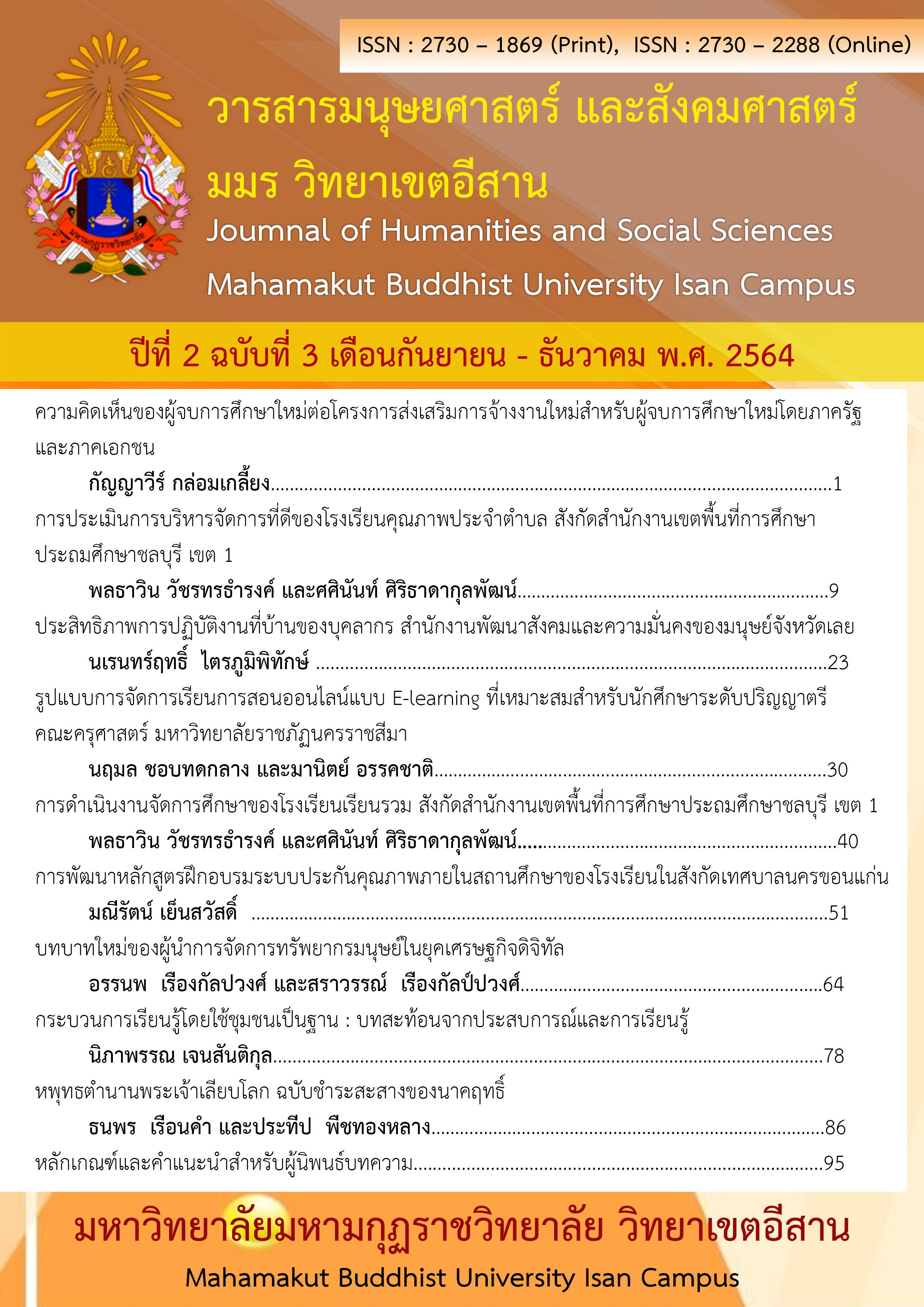Efficiency of Working from Home of Personnel, Office of Social Development and Human Security, Loei Province
Keywords:
Keyword: Efficiency; Work from Home; Office of Social Development and Human SecurityAbstract
Abstract
This research aimed to study the efficiency of working from home and to study the problems and obstacles that arise when personnel work from home at the Social Development and Human Security Office, Loei Province. Data was collected by 30 personnel. The research instruments were questionnaires and data analysis using frequency, percentage, mean, and standard deviation. The findings found that 1) most of the 30 personnel were female (60.00%), between the ages of 31-40 years, (40.00%), graduated with a bachelor's degree (93.33%), and had the longest working period of 1–4 years (40.00%). 2) Most of the personnel had the opinion that working from home was a good practice for reducing the spread and flexibility. Overall, the efficiency of working from home of personnel in the Office of Social Development and Human Security, Loei Province was at the highest level (mean 3.42), followed by quality of work (mean 3.52) and the least in terms of time spent at work (mean 3.23). 3) Problems and obstacles in working from home were the personnel, who had problems with communication devices, differences in personnel ages, and the ability to use technology to communicate, causing inconsistencies in communication about assignments, misunderstandings, and for older personnel, it is inconvenient to use modern communication tools.
References
กรุงเทพธุรกิจออนไลน์. (2563). Work from home คืออะไร ช่วยให้รอดจาก โควิด-19 ได้อย่างไร. สืบค้นเมื่อ 31 มกราคม 2564. จาก https://www.bangkokbiznews.com.
เสาวรัจ รัตนคำฟู และเมธาวี รัชตวิจิน. (2563). ผลกระทบของการทำงานที่บ้าน (Work from home) ในช่วงโควิด-19: กรณีศึกษาของทีดีอาร์ไอ. สืบค้นเมื่อ 15 กุมภาพันธ์ 2564. จาก https://tdri.or.th/2020/05/impact-of-working-from-home-covid-19/.
สำนักงานพัฒนาสังคมและความมั่นคงของมนุษย์จังหวัดเลย. (2562). ประวัติความเป็นมา. สืบค้นเมื่อ 15 กุมภาพันธ์ 2564. จาก http://loei.m-society.go.th/?page_id=725.
อภิชล ทองมั่ง กำเนิดวา และสุรสิทธิ์ ระวังวงศ์. (2563). การทำงานที่บ้าน: แนวทางการจัดการเพื่อเพิ่มประสิทธิภาพและเทคโนโลยีที่เกี่ยวข้อง. วารสารครุศาสตร์อุตสาหกรรม, 19 (3), 119-130.
Church, N. F. (2015). Gauging Perceived Benefits from ‘Working from Home’ as a Job Benefit. International Journal of Business and Economic Development, 3 (3), 81-89.
Dockery, A. M. & Bawa, S. (2014). Is Working from Home Good Work or Bad Work? Evidence from Australian Employees. Australian Journal of Labour Economics, 17 (2), 163-190.
Flores, M.F. (2019). Understanding The Challenges of Remote Working and It’s Impact to Workers. International Journal of Business Marketing and Management, 4 (1), 40-44.
Ford, R.C & Butts, M.A. (1991). Is Your Organization Ready for Telecommuting?. SAM
Advanced Management Journal, 56 (4), 19-23.
Lupu, V.L. (2017). Teleworking and Its Benefits on Work-Life Balance. International
Multidisciplinary Scientific Conference on Social Sciences & Arts SGEM, 693-700.



